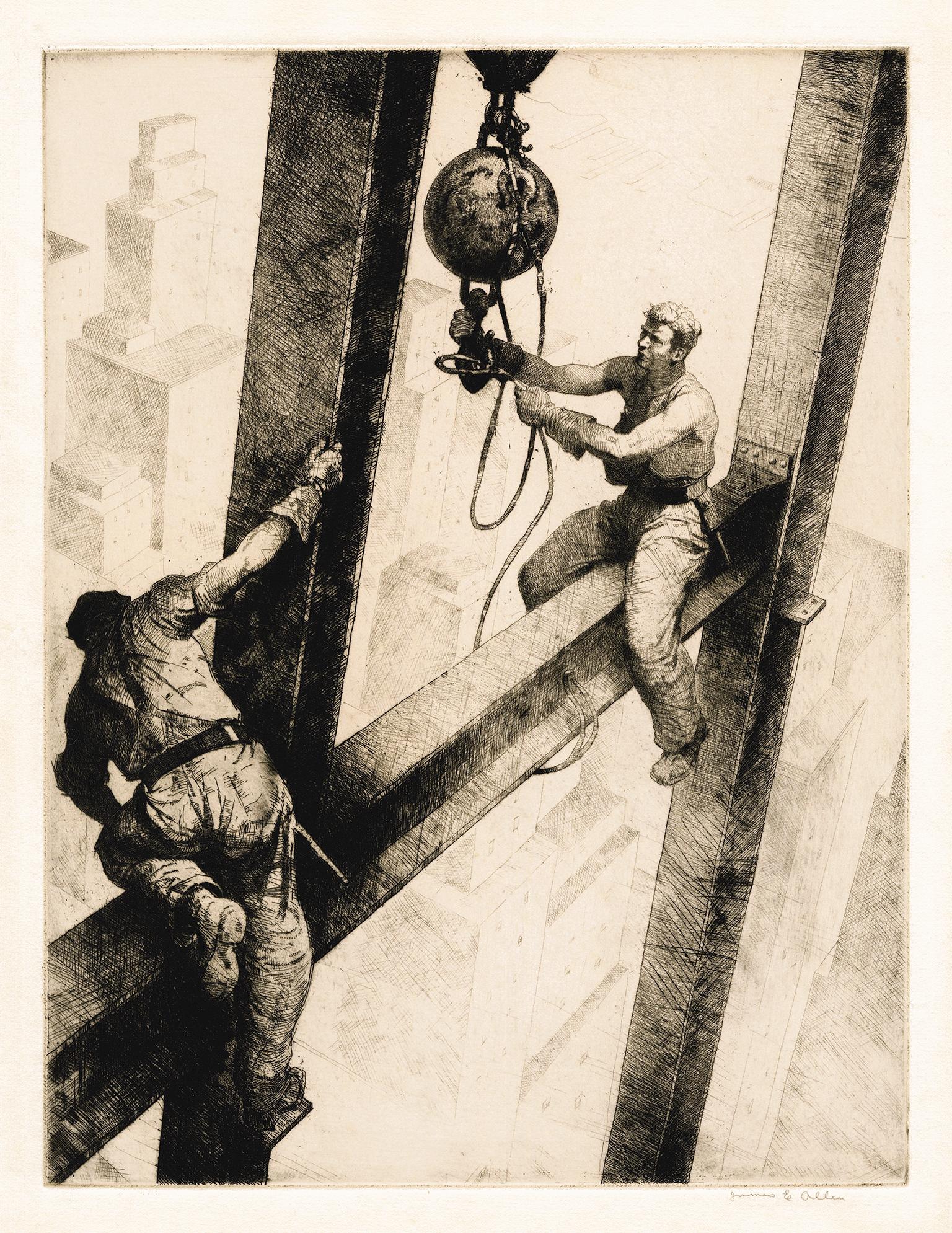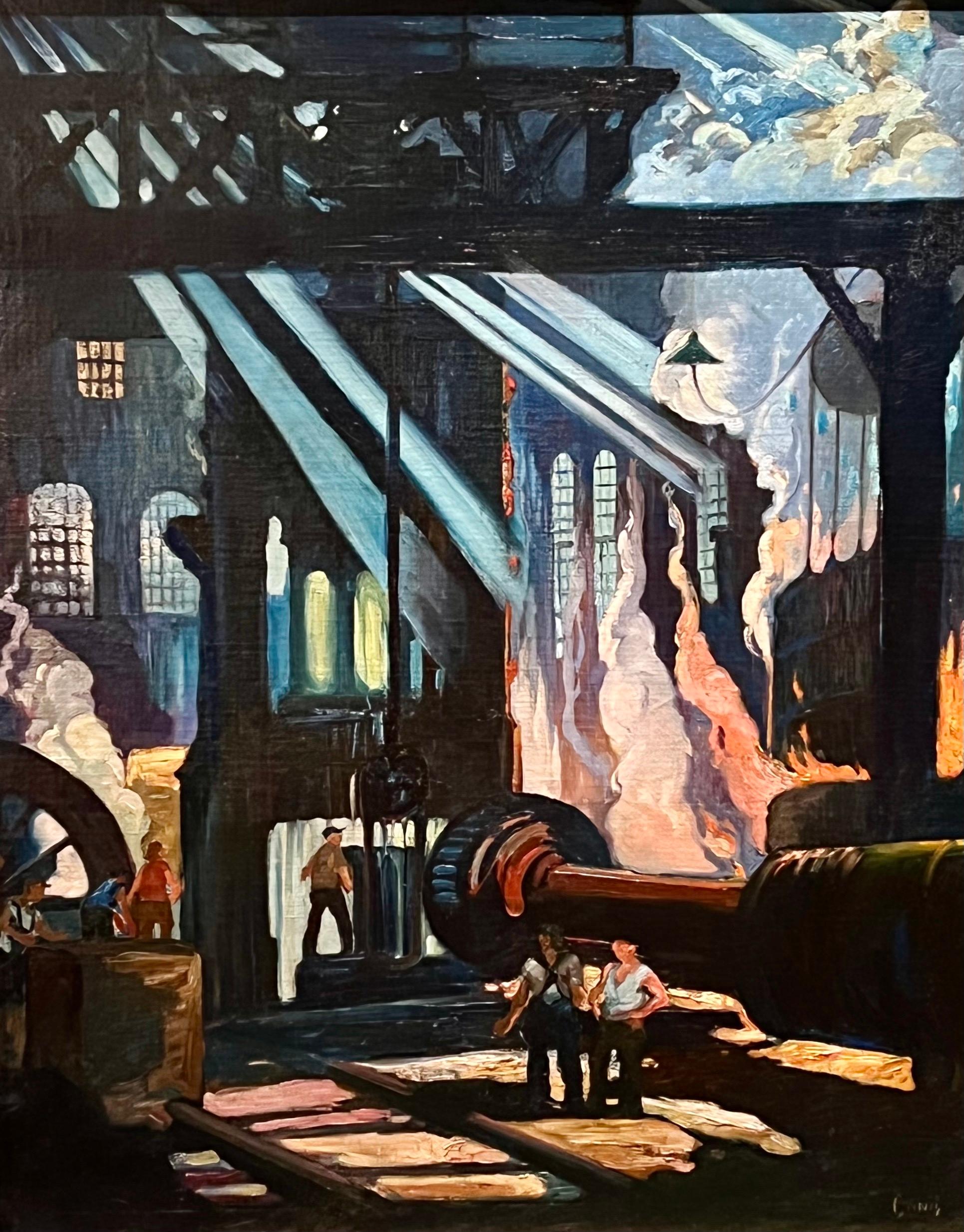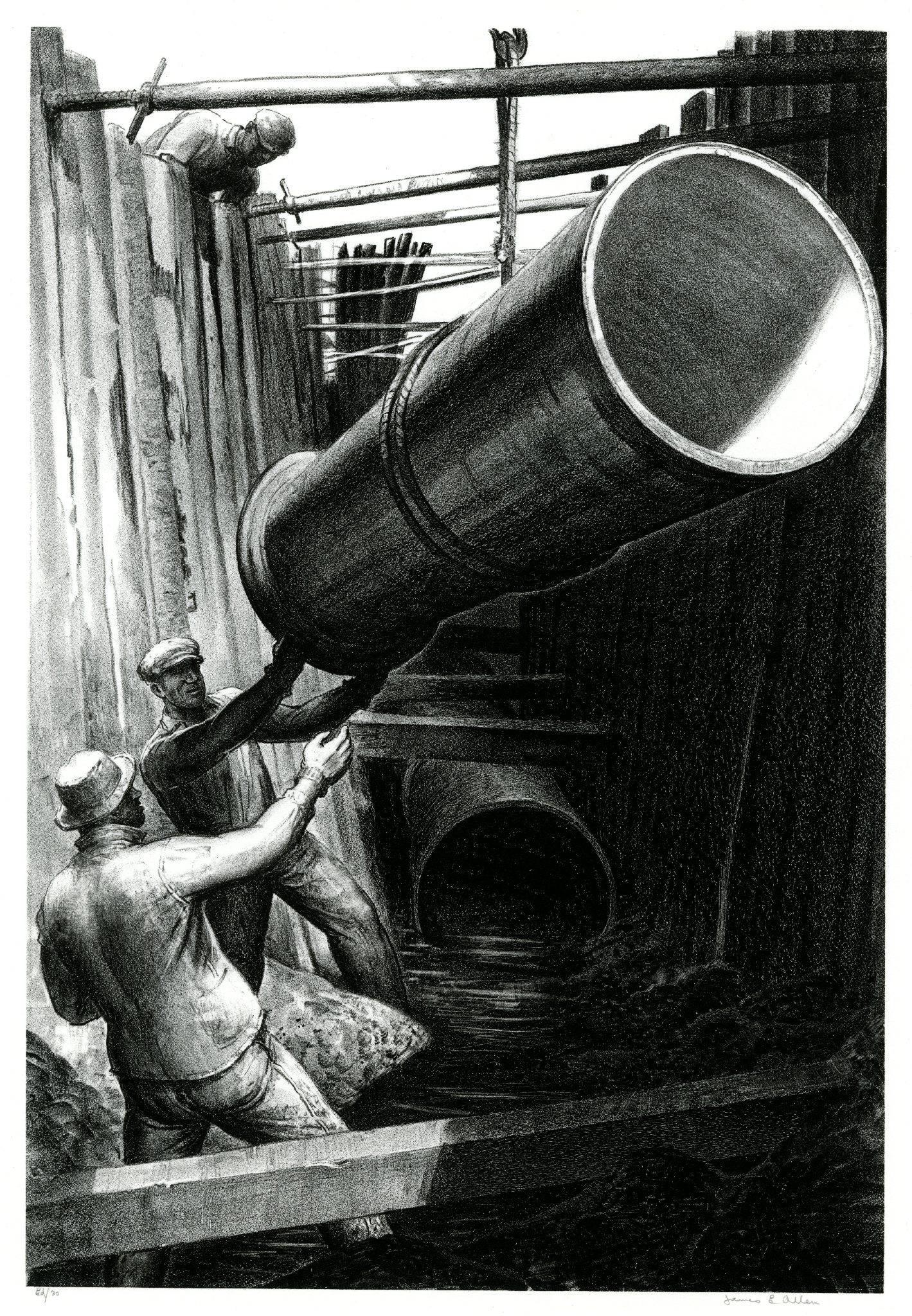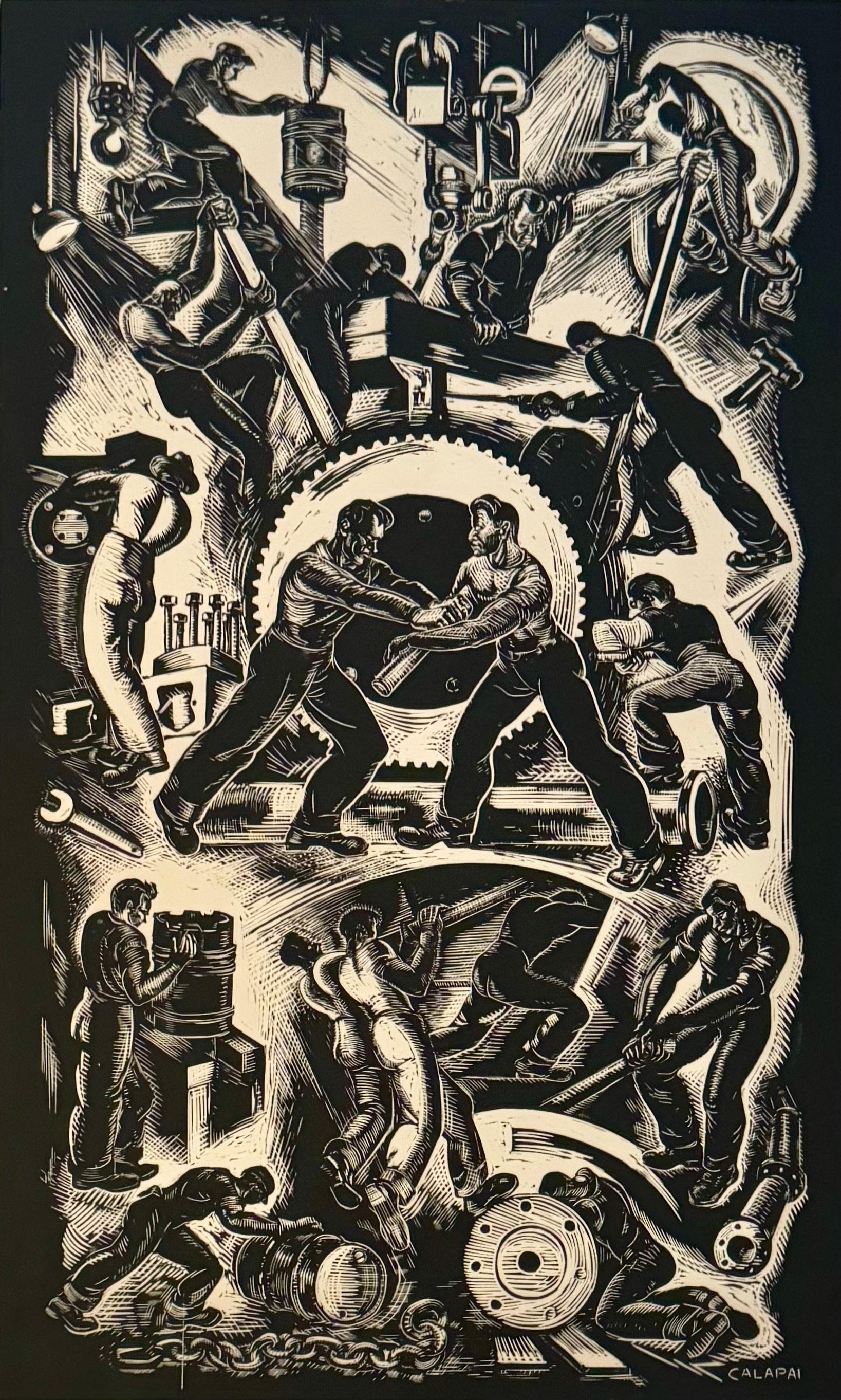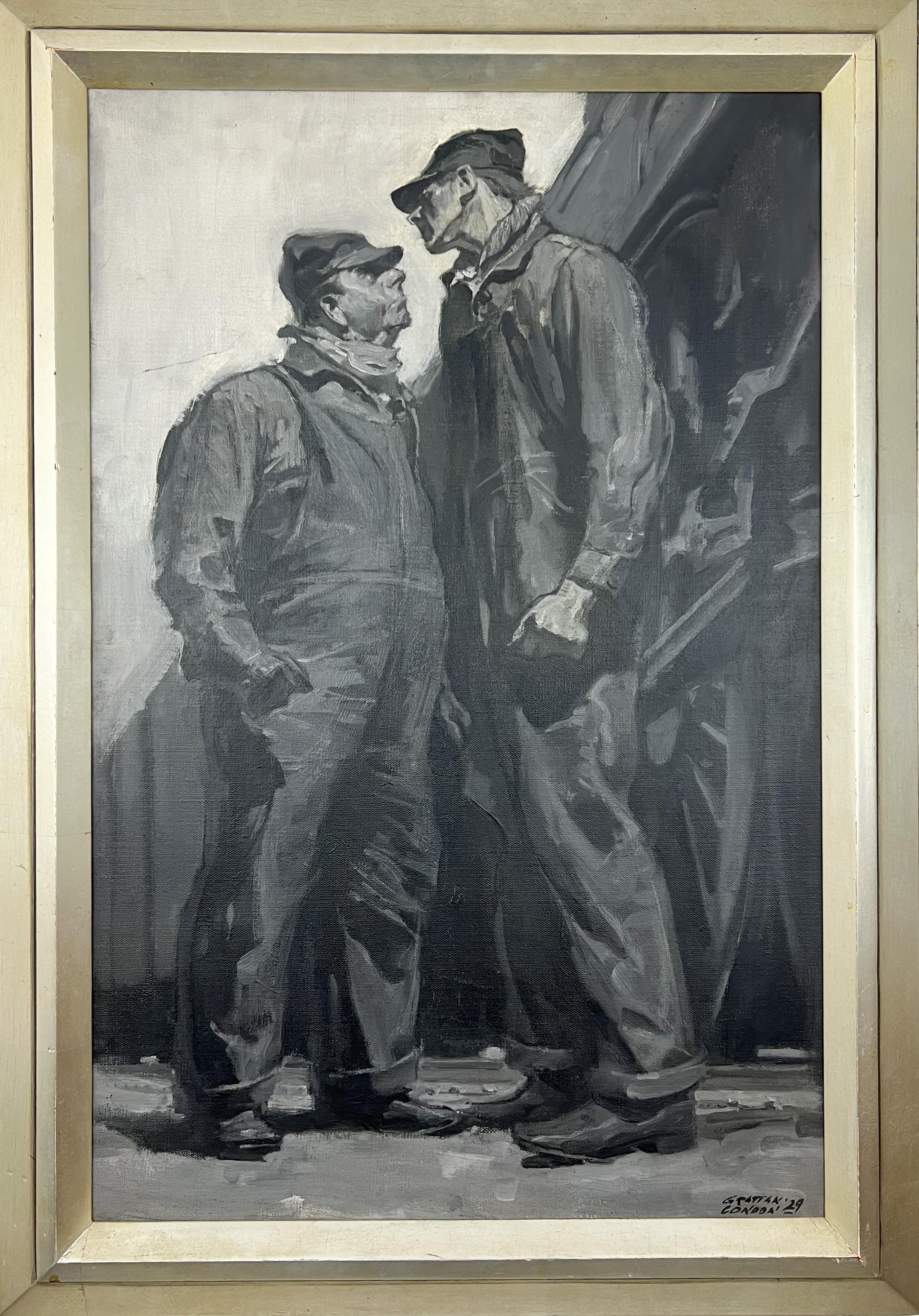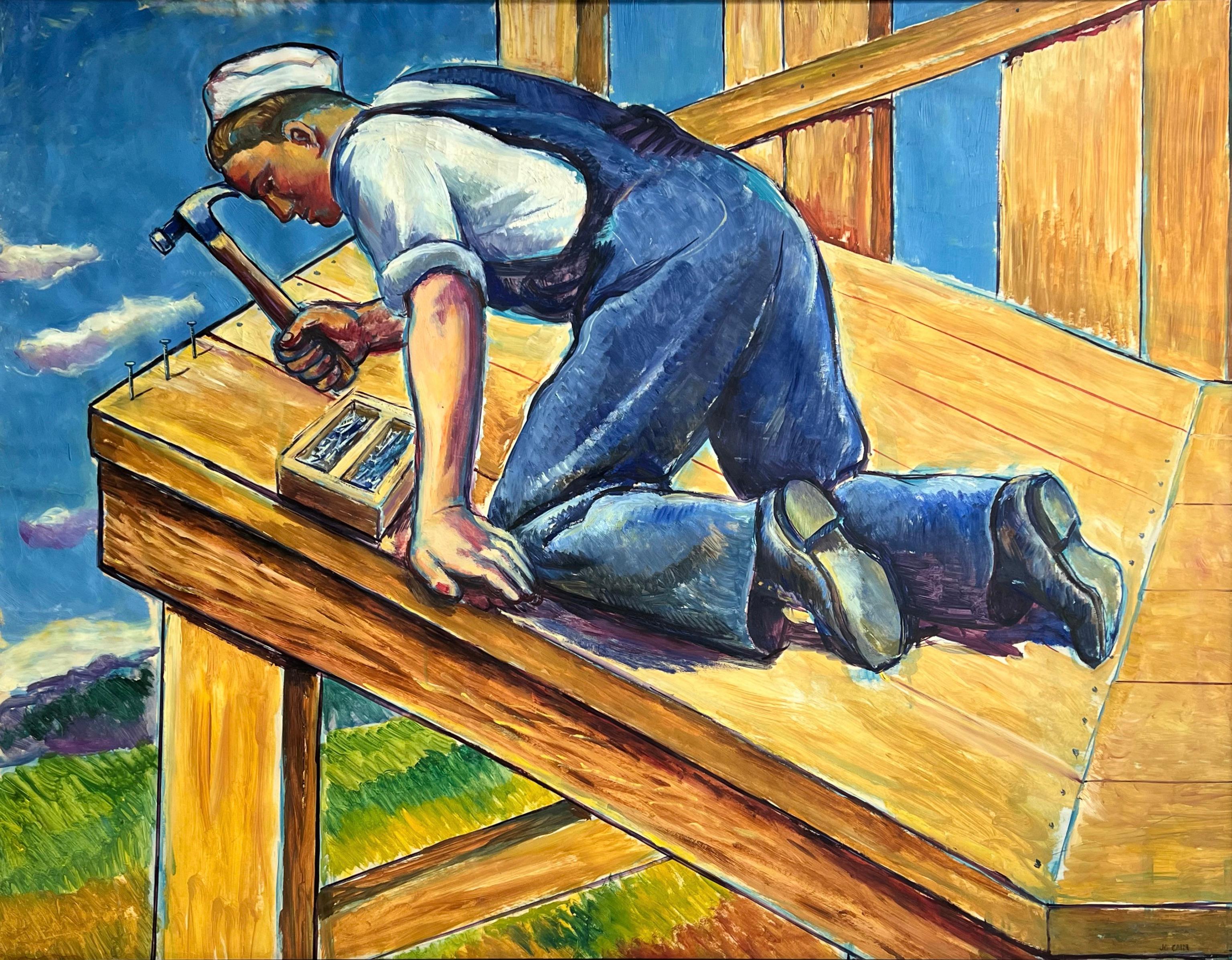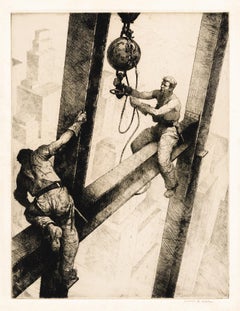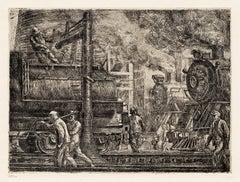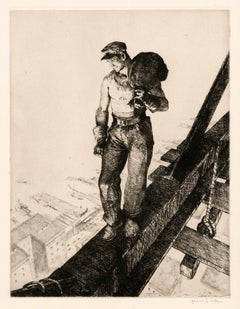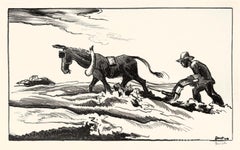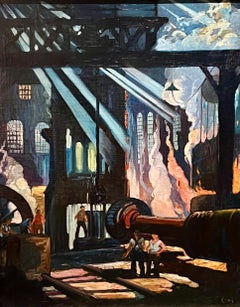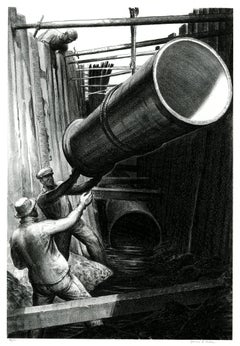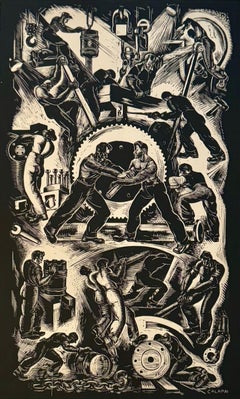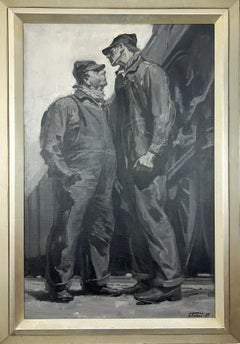Items Similar to 'Pipe and Brawn' — WPA Era American Realism
Want more images or videos?
Request additional images or videos from the seller
1 of 3
James Allen'Pipe and Brawn' — WPA Era American Realism1937
1937
$2,400
£1,870.07
€2,121.53
CA$3,449.34
A$3,798.05
CHF 1,969.46
MX$44,979.41
NOK 25,001
SEK 23,366.27
DKK 15,845.33
About the Item
James Allen, 'Pipe and Brawn,' 1937, lithograph, edition 40. Signed and annotated 'Ed/40' in pencil. A superb, richly inked impression on cream wove paper, the full sheet with margins (1 3/8 to 1 3/4 inches), in excellent condition. Matted to museum standards, unframed.
Image size 11 7/8 x 14 3/8 inches (302 x 365 mm); sheet size 15 x 17 3/8 inches (381 x 441 mm).
This is one of a series of 12 lithographs of cast iron pipe workers commissioned by the United States Pipe and Foundry Company and reproduced in the company's trade journal advertising, 1937-38. The works, created at the height of the Great Depression, have become among Allen's most collected works for their celebration of the working man during the worst economic downturn in the history of the industrialized world.
Impressions of this work are held in the collections of the Smithsonian American Art Museum, the Princeton University Art Museum, and Stanford University.
ABOUT THE ARTIST
James E. Allen is best known for his distinguished printmaking, which focuses on American industry and the workers of the 1930s and 40s. A Montana native, Allen began his art education at the Art Institute of Chicago in 1911, where he studied painting and drawing. After moving to New York City, he worked as an illustrator for popular periodicals such as Collier's and the Saturday Evening Post, as well as for the book publisher Doubleday, Page, and Company. Following his service as a fighter pilot in World War I, he married artist Grace Parmelee and continued his career as a commercial illustrator in New York City.
In the early 1920s, Allen studied etching with Joseph Pennell at the Art Students League in New York. He made his first etching in 1925 in Paris, where he shared a studio with fellow American artist Howard Cook. He drew inspiration from the spatial innovations of cubism, the powerful figural paintings of French artist Georges Rouault, and the structurally rigorous compositions of Paul Cézanne. To enhance his figurative renderings, he adopted the academic practice of drawing from the model.
Returning to New York in 1930 during the Great Depression, he managed to find work in commercial illustration while continuing his studies at the Art Students League and with Arshile Gorky at the Grand Central Art School. He also studied etching privately with William Auerbach-Levy, an accomplished etcher and caricaturist. In 1932, Allen entered his prints in juried exhibitions and received prizes from the Society of American Etchers and New York's Salmagundi Club. Throughout the 1930s, his prints were regularly exhibited in New York and nationally, drawing critical acclaim. Allen specialized in realistically depicting the construction of bridges and skyscrapers, as well as images of factory workers and industrial laborers.
When the Sinclair Refining Company commissioned him to update its dinosaur logo, Allen conducted scientific studies at the American Museum of Natural History, leading to a series of lithographs of dinosaurs and modern wildlife. In 1937, he was commissioned to create twelve lithographs for the United States Pipe and Foundry Company, depicting laborers installing giant pipe sections and laying pipelines in various terrains. In 1938, the Graphic Arts Division of the Smithsonian's Museum of American History presented a solo exhibition of Allen's work, elevating his stature as a master printmaker.
In 1943, after creating over ninety prints, Allen shifted his focus to painting. He studied with abstract painter Hans Hofmann and exhibited his compositions at a solo show at New York's Rehn Gallery in 1950. Unfortunately, a degenerative brain disease cut short his career, and he passed away fourteen years later.
Allen’s graphic works are represented in the collections of various prominent institutions, including the Ackland Art Museum, Akron Art Museum, Amon Carter Museum of American Art, Boston Public Library, British Museum (London), Cornell University Library, Crystal Bridges Museum of American Art, Five Colleges and Historic Deerfield Museum Consortium, Hood Museum, Library of Congress, Metropolitan Museum of Art, National Building Museum, National Gallery of Art, Smithsonian American Art Museum, Terra Foundation for American Art, and the Yale University Art Gallery.
- Creator:
- Creation Year:1937
- Dimensions:Height: 11 in (27.94 cm)Width: 8.44 in (21.44 cm)
- Medium:
- Movement & Style:
- Period:
- Condition:
- Gallery Location:Myrtle Beach, SC
- Reference Number:Seller: 1042401stDibs: LU532313080202
About the Seller
5.0
Recognized Seller
These prestigious sellers are industry leaders and represent the highest echelon for item quality and design.
Platinum Seller
Premium sellers with a 4.7+ rating and 24-hour response times
Established in 1995
1stDibs seller since 2016
331 sales on 1stDibs
Typical response time: 1 hour
Associations
International Fine Print Dealers Association
- ShippingRetrieving quote...Shipping from: Myrtle Beach, SC
- Return Policy
More From This Seller
View All'The Connectors' — Vintage American Realism, New York City
By James Allen
Located in Myrtle Beach, SC
James Allen, 'The Connectors', 1934, etching, edition not stated, Ryan 66. Signed in pencil. A superb, richly-inked impression, on handmade, cream laid paper, with margins (1/2 to 1...
Category
1930s American Realist Figurative Prints
Materials
Etching
'Locomotives Watering' — Ashcan School Social Realism
By Reginald Marsh
Located in Myrtle Beach, SC
Reginald Marsh, 'Erie R.R. Locos Watering (Locomotives Watering)', etching, 1934, edition 100 (Whitney, 1969), Sasowsky 155. Unsigned as published; numbered '68/100' in pencil. A su...
Category
1930s Ashcan School Figurative Prints
Materials
Etching
'Spiderboy' — American Realism, New York City
By James Allen
Located in Myrtle Beach, SC
James Allen, 'Spiderboy', 1937, etching, edition 40, Ryan 86. Signed in pencil. A superb, richly-inked impression, on cream laid paper, with full margins (1 1/4 to 2 7/8 inches). A s...
Category
1930s American Realist Figurative Prints
Materials
Etching
'Plowing It Under' — WPA Era American Regionalism
By Thomas Hart Benton
Located in Myrtle Beach, SC
Thomas Hart Benton, 'Goin' Home', lithograph, 1937, edition 250, Fath 14. Signed in pencil. Signed in the stone, lower right. A fine, richly-inked impression, on off-white, wove pape...
Category
1930s American Realist Figurative Prints
Materials
Lithograph
'Corner of Steel Plant' — American Modernism / Precisionism
By Louis Lozowick
Located in Myrtle Beach, SC
Louis Lozowick, 'Corner of Steel Plant', lithograph, 1929, edition 25, and 10 printed in 1972; Flint 21. Signed, titled, dated, and numbered 'I/X' in penci...
Category
1920s American Modern Figurative Prints
Materials
Lithograph
'The Furnace' — American Expressionism
By Otto Kuhler
Located in Myrtle Beach, SC
Otto Kuhler, 'The Furnace', drypoint, edition 26, 1924, Kennedy 5. Signed and annotated 'Drypoint. Ltd Ed. Del. et imp.' in pencil. Titled in pencil, in the bottom center sheet edge....
Category
1920s American Modern Figurative Prints
Materials
Drypoint
You May Also Like
Industrial Mid-20th Century WPA Modern Men Working American Scene Social Realism
Located in New York, NY
Industrial Mid-20th Century WPA Modern Men Working American Scene Social Realism
George Pearse Ennis (American, 1884-1936)
"Forging a Gun Tube #1...
Category
1910s American Modern Interior Paintings
Materials
Canvas, Oil
The Trench
By James Allen
Located in Fairlawn, OH
The Trench
Lithograph, 1937
Signed and annotated in pencil (see photos)
Edition: 30
Provenance:
Estate of the Artist
Mary Ryan Gallery
Frac Teck Services, Ft. Worth, TX
Part of a se...
Category
1930s American Realist Figurative Prints
Materials
Lithograph
"Labor in a Diesel Plant" Machine Age American Scene Industrial Mid 20th Century
By Letterio Calapai
Located in New York, NY
"Labor in a Diesel Plant" Machine Age American Scene Industrial Mid 20th Century
Letterio Calapai (American 1902-1993)
''Labor in A Diesel Plant''
Wood engraving, 1940
17 x 10 1/2...
Category
1940s American Modern Figurative Prints
Materials
Lithograph
Wide-Open Throttle Illustration for Saturday Evening Post. Grisaille Painting.
By Grattan Condon
Located in Marco Island, FL
Illustration by Grattan Condon for the February 8, 1930 Saturday Evening Post story entitled "Wide-Open Throttle" by A.W. Somerville, which appeared on page 56. The tension between ...
Category
1920s American Realist Figurative Paintings
Materials
Oil, Canvas
Industrial Man Working Mid 20th Century American Scene Social Realism Modern WPA
By Jo Cain
Located in New York, NY
Industrial Man Working Mid 20th Century American Scene Social Realism Modern WPA
Jo Cain (1904 - 2003)
Hammering Nails
39 x 50 ½ inches
Gouache on paper c. 19...
Category
1930s American Realist Figurative Drawings and Watercolors
Materials
Paper, Gouache
Industry and Commerce
Located in Los Angeles, CA
This mural study is part of our exhibition America Coast to Coast: Artists of the 1930s
Industry and Commerce, 1936, tempera on panel, 16 ½ x 39 ½ inches, signed verso “John Ballator, Portland Ore.” provenance includes: J.C. Penney Company, represented by Russell Tether Fine Arts Assoc.; presented in a newer wood frame
About the Painting
Industry and Commerce is a prime example of WPA Era muralism. Like a Mediaeval alter, this mural study is filled with icons, but the images of saints and martyrs are replaced with symbols of America's gospel of prosperity through capitalism. Industry and Commerce has a strong narrative quality with vignettes filling the entire surface. Extraction, logistics, design, power generation, and manufacturing for printing, chemicals, automobiles and metal products are all represented. To eliminate any doubt about the mural's themes, Ballator letters a description into the bottom of the study. Ballator also presents an idealized version of industrial cooperation, as his workers, lab-coated technicians and tie-wearing managers work harmoniously toward a common goal in the tidy and neatly designed environments. Although far from the reality of most industrial spaces, Ballator's study reflects the idealized and morale boosting tone that many mural projects adopted during the Great Depression.
About the Artist
John R Ballator achieved success as a muralist, lithographer, and teacher during the Great Depression. Born in Oregon, he studied at the Portland Museum Art School, the University of Oregon and at Yale University where he received a Bachelor of Fine Art. In 1936, Ballator was commissioned to paint a mural panel for the new Department of Justice Building in Washington DC, an important project that spanned five years with several dozen artists contributing a total of sixty-eight designs. Ballator completed murals for the St. Johns Post Office and Franklin High School, both in Portland, Oregon. He also contributed to the 1938 murals at Nathan Hale School in New Haven, Connecticut. During the late 1930s, Ballator taught art for several years at Washburn College in Topeka, Kanas, where he completed a mural for the Menninger Arts & Craft Shop before accepting a professorship at Hollins College...
Category
1930s American Realist Figurative Paintings
Materials
Tempera
More Ways To Browse
Iron Worker
James E Allen
Andrew Wyeth Signed And Numbered Prints
Andy Warhol Electric Chairs
Ben Shahn Martin Luther King
Bus Stop Sign
Cain And Abel
Calder Behind The Mirror
Corneille On Sale
Cundo Bermudez
Dali Death
Dali Flowers
Dali Hell
Dali Ronsard
Deux Femmes Nues
Enrico Baj On Sale
Feliks Topolski
Francois Gilot
